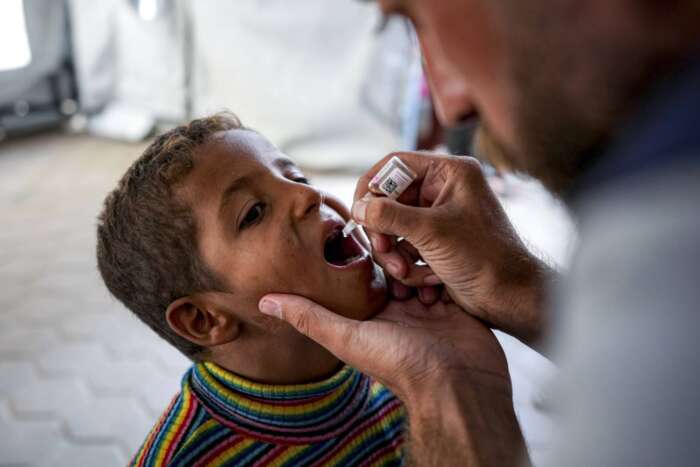At a medical center in the Al-Zawayda camp in central Gaza Strip, Palestinian Basma Al-Batsh cannot hide her joy with the arrival of polio vaccines that will enable her children and thousands of other children to gain immunity against the disease that has returned to the besieged and devastated strip.
Dozens of parents gathered with their children in front of the center, waiting for the children to receive the vaccine from medical staff distributed around the area. They had received text messages on their phones in the morning asking them to bring their children.
One of the children opens his mouth as the medical worker administers two drops of the vaccine.
Al-Batsh says, “I feel happy and relieved… I was afraid for my children from paralysis and diseases.”
She adds, “But thank God, I am happy now because my children will get the vaccine.”
The polio vaccination campaign officially began on Sunday in the Gaza Strip, according to a health official who spoke to Agence France-Presse.
The United Nations had announced that the campaign would take place in phases across all areas of the Palestinian strip, which has been experiencing a devastating war for nearly eleven months, and it will be accompanied by “humanitarian pauses,” the conditions of which have not been fully clarified.
The UN announced the vaccination campaign after last month’s first polio case in a quarter-century was recorded in Gaza. The victim was a ten-month-old child in central Gaza. His family, which has had to relocate multiple times due to the war, said they were never able to vaccinate him, as has been the case with many children in the strip.
A spokesperson for the United Nations Relief and Works Agency for Palestine Refugees (UNRWA), Louise Wateridge, confirmed that about two thousand children were vaccinated at a clinic in Deir al-Balah on Sunday.
She explained that there are mobile teams moving between the tents, and an ink mark is placed on the thumb of the child who has been vaccinated.
The poliovirus is most commonly spread through sewage and contaminated water and is highly contagious.
It can cause deformities, permanent paralysis, and can be deadly. It mainly affects children under the age of five.
The United Nations sent 1.26 million doses of the oral vaccine.
Ghadir Haji says she felt scared when she heard about a recorded case of polio.
She adds, “We felt fear for our children and demanded that they be vaccinated.”
According to Haji, “We received messages from the Ministry of Health and came here immediately.” The mother of five says, “They all got vaccinated.”
At the medical center in Al-Zawayda, boxes of vaccines bearing the name of UNICEF were stacked in one room.
Outside, someone was distributing booklets titled “Questions and Answers About Polio,” while posters about the campaign were hung on the walls of the center.
A number of children received vaccines in Khan Younis in the southern strip on Saturday, before the official start of the campaign.
The World Health Organization announced that Israel agreed to a series of “humanitarian pauses” each lasting three days in the central, southern, and northern parts of the strip to implement a vaccination campaign covering 640,000 children across Gaza. However, Israeli Prime Minister Benjamin Netanyahu emphasized that these temporary pauses “are not a ceasefire.”
The medical director of Al-Awda Hospital (central), Yasser Shaaban, announced that the vaccination begins today at nine in the morning (6:00 GMT).
Field reports did not indicate any shelling or military operations until two in the afternoon, the initially scheduled end time for today’s pause.
